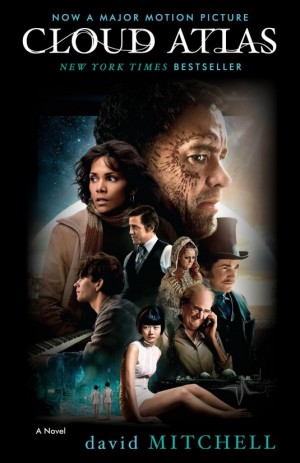
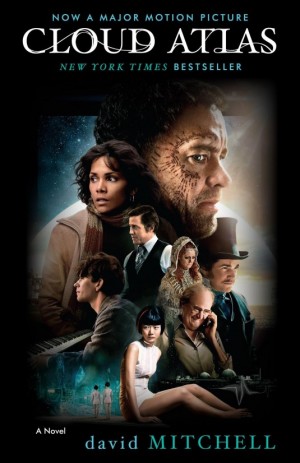
Cloud Atlas, a movie based on the novel of the same name, is a bundle of stories with interconnecting threads meant to form a greater pattern, a message to the viewer. We are all in this together, we conclude by the movie’s end. Sometimes we are nice to each other, and sometimes we are not, but either way our actions resonate into the future, even as they were partly shaped by actions from the past that resonated into the present. The filmmakers are successful in creating this pattern, but as a piece of entertainment and a storytelling vehicle, the movie itself achieves only limited success.
Each story of the larger tale is engaging by itself. That is, the scenario created is interesting enough and worthy of its own movie. The scenes are shot well, and thoughtfully, and the worlds, ranging from far in the past to far in the future, are imaginative conceptions where many other stories might take place. Given this format, it is difficult to summarize the film, which is just as well because watching it becomes more of an exercise in identifying themes and spotting parallels than in following a plot.
The cutting between stories is done in such a way as to prevent momentum from accruing. While I have read many good books that switched between multiple characters to good effect, these books had the characters as part of the same story, so that an advance in the plot of one character’s story had immediate and important ramifications for the other characters, wherever they were in their story arcs. Each chapter usually had a beginning, middle, and end, as if it were its own short story, and finished with some sort of hook to make you regret leaving that character.
In Cloud Atlas, a character in one tale might compose music that another character hears decades later, but the connection is only important for the theme; it has no bearing on the obstacles to be overcome in the endeavor to reach a goal. With only a handful of exceptions, the characters in later times are not even aware of the ones who anteceded them. Imagine taking scenes from Amistad, Blade Runner, Star Wars, Miller’s Crossing, and Three Days of the Condor and mixing them together into one film. As far as the plot goes, this is almost exactly how isolated each story is from the others, how little they have to do with one another.
[continue reading…]
Help Promote Prometheus Unbound by Sharing this Post
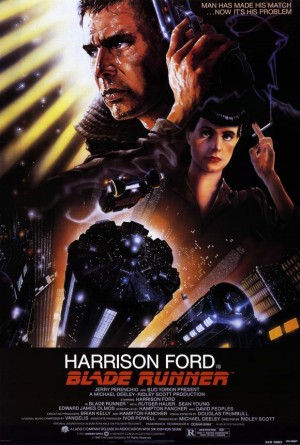
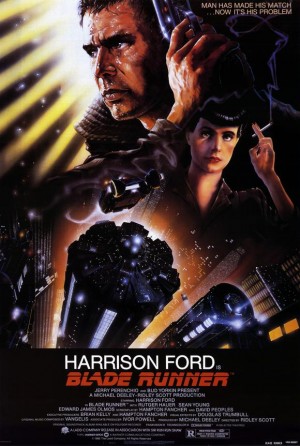
There are many elements of science fiction that find their way into stories that are not science fiction. Many times, enthusiasts of the genre will try to claim these works as part of the family. Atlas Shrugged and 1984 are examples. The same thing happens, only more frequently, with noir. Sometimes, the mere presence of a morally ambiguous protagonist is enough for a piece to be so labeled.
Ridley Scott’s Blade Runner, however, is a rare work — quite possibly unique — that may fit both bills. While perhaps not classically noir, there is no denying a strong noir presence, and its science fiction credentials are beyond question, what with the flying cars and androids, called replicants, and off-world colonies. As a devotee of both genres, I quite naturally am a fan of the director’s third film, but watching it is an experience both frustrating and pleasant. It is a good movie, but not the great one it could have been.
Alien, Scott’s second feature, is a masterpiece whose best form made it to the silver screen. One simply cannot imagine a better version. Blade Runner, however, is a movie whose perfect version was never realized, whose potential was never reached. That mirage of the ideal Blade Runner intrudes on my thoughts every so often, and I find myself reaching for the DVD, thinking that perhaps this will be the viewing where I get it, where I notice that missing part or make that important connection.
It never works out that way. As usually happens in life, experience trumps hope. The movie simply is not as good as it ought to have been, and the reason is the plot. This is all the more tragic given that Philip K. Dick, in the novel Do Androids Dream of Electric Sheep?, had already provided a first-rate plot that was later diluted over multiple drafts of the screeenplay.
[continue reading…]
Help Promote Prometheus Unbound by Sharing this Post
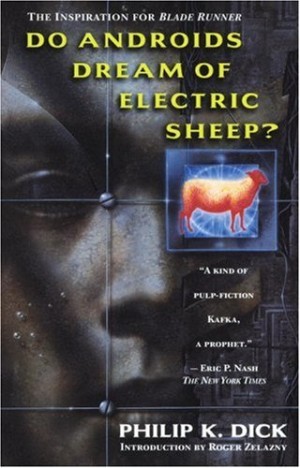
Do Androids Dream of Electric Sheep? is probably Philip K. Dick’s most famous work, given that it was turned into one of the most respected science fiction films of all time. I do not hold to the absolutist opinion that the book is always better than the movie, but after one read of the book and many viewings of the movie, I am inclined to say that, in this instance, the book is at least as good and in some respects is better.
Rick Deckard, along with numerous other unfortunate souls, has been left behind on Earth, an unhealthy wasteland from which anyone of means has migrated. He is the number two man assigned to retire rogue androids who try to pass themselves off as human. The androids, however, prefer to remain alive.
Deckard makes a modest living, but when the number one guy is nearly killed by an android, he assumes the responsibility to retire a group of six of them, seeing in the job an opportunity to make some much-needed cash. Insert canned line about things not going as planned. Insert second canned line about the job being more than he bargained for.
As I expected, the clownish dialogue and behavior, unnecessarily detailed descriptions and lengthy back stories injected into scenes immediately after a character’s introduction — the slipshod method by which so many authors introduce and develop their characters — is absent. Instead, we meet people who feel and act real, and we come to know them as we would anyone else: by how they act, what they say, and what is said about them. They move about in an exotic land but act in accordance with their human goals and abilities.
What I found surprising was how good the plot was. There is a satisfying quantity and variety of dramatic interactions, various obstacles to overcome, a sufficiently grand and tense third act… everything an eager reader could hope for. I did not expect a poorly wrought narrative, but given some of the difficulties I found in The Man in the High Castle, I thought that maybe character and setting were Dick’s strengths, not plot. The movie, as good as it is, strikes one as underplotted, and I assumed this was due to a deficiency on the book’s part.
[continue reading…]
Help Promote Prometheus Unbound by Sharing this Post
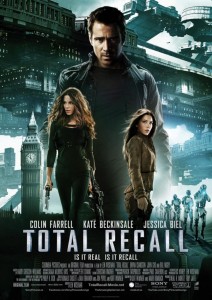
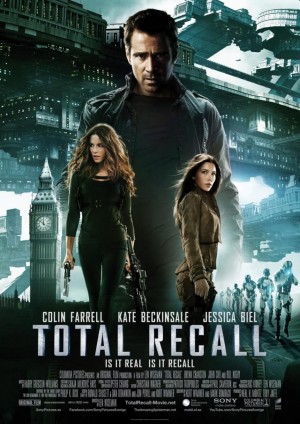
Another movie joins the list of remakes that have, of late, come pouring out of Hollywood. Total Recall has been reimagined for the CGI era, much changed now but sharing just enough plot and details to justify the shared appellation. As I recall, the first Total Recall, starring Arnold Schwarzenegger, was an entertaining bit of science fiction with some action and a satisfying twist or two thrown in. The recent version does not reach the same level, falling short mainly because it invests less in the human element, although it does surpass its predecessor in some areas.
The main characters return with the same names. Colin Farrell plays Douglas Quaid, a blue-collar worker with an itch he does not know how to scratch, a vague sense that something is not right with his life. His wife Lori is played this time by Kate Beckinsale, while the rebel Melina is Jessica Biel. When Quaid goes to Rekall, a company that can insert memories of better times into a client’s brain, they discover that the fake memories of espionage and danger that he is asking for are already in his brain, except that they are real.
Quaid has just a few seconds to process this shock before police burst into the facility and try to arrest him. To his own surprise, instincts and muscle memory kick in and he takes out the squad of cops. The chase is on. When he rushes home and tells his wife, she springs a bombshell on him that catapults the plot forward.
[continue reading…]
Help Promote Prometheus Unbound by Sharing this Post
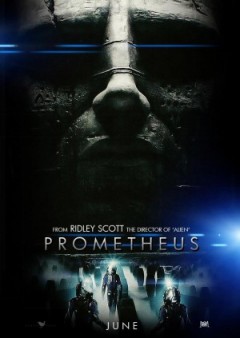
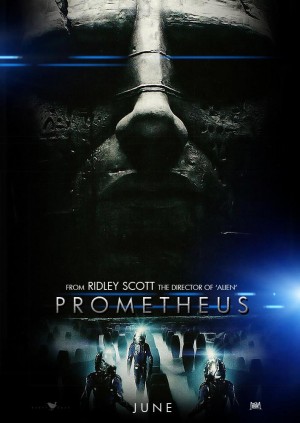
One cannot help but notice that, cinematically speaking, director Ridley Scott’s best days seem to be behind him. They were glorious days, though short lived; nothing after Blade Runner could compare to his second and third films. One might also note that he left his best days behind at precisely the time when he left behind science fiction. It is understandable, then, if one supposes that a return to the genre that made him might also be a return to form. Alas, it is not so. Scott’s latest feature, Prometheus, is a disappointment even for one whose expectations were not that lofty.
Prometheus returns us to the universe of Alien, that sublime work of sci-fi horror that remade an entire genre. This time, it is the late twenty-first century, a few decades before Ripley, Dallas, Parker, and the rest will land on LV426. Cave paintings all over the world, and from many different millennia, have been found to depict a giant gesturing to the stars as smaller, human forms worship him. Through means not satisfactorily explained, two scientists, Charlie Holloway (Logan Marshall-Green) and Elizabeth Shaw (Noomi Rapace), determine that this is an invitation from a race that created our kind. Not only that, but they are able to pinpoint the star system to which we have been beckoned. The infamous Weyland-Yutani corporation bankrolls a scientific expedition to the system and danger ensues.
A strange approach to the movie is taken, one which is a peculiar fit for a prequel to Alien. Whereas the original started when the story started, introduced us to believable characters whom we slowly came to know only by how they acted and interacted, and got down to the business of slowly creeping us out before scaring us senseless, Prometheus attempts a good deal more. It begins with an ill-advised prologue in which we see one of the mysterious beings, instead of discovering them for the first time with the crew later in the movie. After the prologue we see the prelude to the expedition, the scientists discovering one of the cave paintings, something rendered entirely unnecessary when they explain it all to the crew anyway after coming out of hypersleep. They even spend some time with character back story.
[continue reading…]
Help Promote Prometheus Unbound by Sharing this Post
If you enjoy dystopian fiction, and dystopias often provide great fodder for libertarians, be sure to keep an eye on Tor.com this week.
From the announcement:
“It was a bright cold day in April, and the clocks were striking thirteen.” —Nineteen Eighty-Four
Over sixty years later, 1984 has come and gone, but Orwell’s unsettling vision of the future continues to resonate throughout our culture, along with so many other great dystopian works of the last century, from Fahrenheit 451 toThe Hunger Games, Metropolis to Blade Runner, Harrison Bergeron to The Handmaid’s Tale…the list goes on and on and so, on this bright, not-so-cold day in April, we’re pleased to announce a weeklong celebration of a subgenre which has continually challenged the comfortable boundaries of our imaginations.
[continue reading…]
Help Promote Prometheus Unbound by Sharing this Post

















